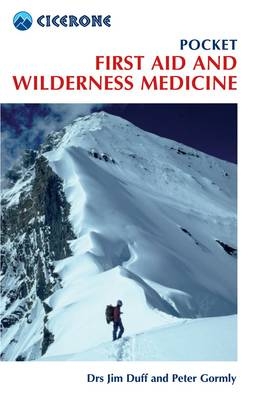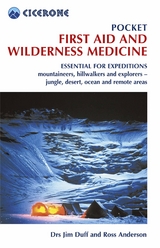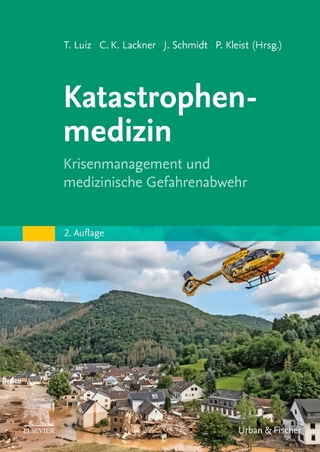
Pocket First Aid and Wilderness Medicine
Cicerone Press (Verlag)
978-1-85284-715-9 (ISBN)
- Titel ist leider vergriffen;
keine Neuauflage - Artikel merken
Written by renowned experts Jim Duff and Peter Gormly, this guidebook describes basic first aid techniques for those travelling in wilderness areas. Deals with fundamentals such as preparation, prevention, first aid kits and the use of medications and painkillers; and provides details on how to deal with a variety of accidents and illnesses. Venturing into remote areas involves a degree of risk. Minimizing these risks, while feeling confident in your ability to deal with any potential injury or illness, is part of the challenge and satisfaction of wilderness travel. This book is divided into 3 parts:
Part 1. THE FUNDAMENTALS - preparation, prevention, first aid kits and the use of medications and painkillers.
Part 2. ACCIDENT AND ILLNESS PROCEDURE - how to deal with any accident and illness, including emergency treatment for life-threatening situations.
Part 3. PROBLEMS AND THEIR TREATMENT - specific accidents and illnesses.
The authors' wilderness experience was gained as mountaineers in Scotland, Norway, the European Alps, New Zealand, the Himalayas and Antarctica.
Jim Duff has more than 30 years' experience of climbing, trekking and teaching wilderness medicine, first aid and leadership in the Himalayas. He was doctor on Chris Bonington's 1975 Expedition, which made the first ascent of Everest's Southwest face, and on the Australian first ascent of the North face of Everest in 1984. As well as expeditions to K2 and Changabang, Jim has climbed in the UK, the Alps, Norway, New Zealand and North America. Dr Peter Gormly was involved in safety, first aid and health issues in Antarctica for many years.
Diagram: The skeleton
Diagram: The internal organs
Abbreviations and conversion tables
Preface
READ THIS
PART 1 THE FUNDAMENTALS
1 Prevention
Preparation (hope for the best, plan for the worst)
Keeping healthy
Safety in extreme climates
Particular situations
Care of local people
2 Positioning and moving a victim
Positioning a victim
Immobilization techniques
Ways to move a victim
3 Medications - what you need to know
The basics
Special considerations
At altitude
4 Pain management
Painkillers (analgesics)
Other medications and techniques for pain relief
PART 2 ACCIDENT AND ILLNESS PROTOCOL
5 Accident and illness protocol summary
6 Primary survey - dealing with life-threatening emergencies
Response
Airway
Breathing
CPR or chest compressions
7 Primary survey for specific situations
Suspected spinal injuries
Life-threatening bleeding
Choking (blocked airway)
Near-drowning (submersion)
Hypothermic victim
Primary survey for children
Fainting
Triage
8 Shock management
Common causes of shock
Symptoms and signs of shock
Shock prevention and management
9 Secondary survey - working out what the problem is
Taking a medical history
Carrying out a physical examination
Checking the vital signs
10 Evacuation
Sending for help
Evacuating the victim
Helicopter evacuation
PART 3 PROBLEMS AND THEIR TREATMENT
11 Spinal and head injuries
General management of spinal and head injuries
Spinal (neck and backbone) injuries
Head (skull and brain) injuries
12 Burns
Burn management
Specific burns
13 Broken bones and dislocations
General management of broken bones (fractures)
Specific broken bones
General management of dislocations
Specific dislocations
14 Sprains and strains
General management of sprains and strains
Specific sprains and strains
15 Wounds
General management of wounds
Complications
Specific wounds
16 Bites, stings and toxins
On land
At sea
17 Near-drowning and diving problems
Near-drowning (submersion)
Diving
18 Altitude illness - AMS, HACE and HAPE
AMS, HACE and HAPE
Treatment of altitude illness
Going back up again?
Treatment of altitude illness (table)
19 Cold weather problems
Hypothermia
Frostnip and frostbite
20 Hot weather problems
Heat stress, heat exhaustion and heat stroke
Other hot weather problems
21 Dehydration
Type of rehydration
Amount of rehydration liquid
Rate of rehydration
22 Diarrhoea and food poisoning
Mild diarrhoea
Severe diarrhoea
Food poisoning
23 Abdominal (belly) problems
Common abdominal problems
Serious abdominal problems
Specific serious abdominal problems
24 Respiratory problems
Respiratory tract infections
Non-infective respiratory problems
25 Infectious diseases
Malaria
Typhoid
Meningitis
Tick-borne diseases
Viral illnesses
Dengue fever
Hepatitis A
Rabies
Yellow fever
Japanese B encephalitis
Other infectious diseases
26 Eyes, ears and mouth
Eyes
Ears
Mouth and teeth
27 Skin problems
Rashes
Other skin problems
28 Gender-specific problems and STIs
Women
Men
Sexually transmitted infections (STIs)
29 Other problems
Allergy
Diabetes
Epilepsy (Grand Mal)
Fever (cause unknown)
Headache and migraine
Blood circulation (vascular) problems
Mental problems
Insomnia (cannot sleep, poor sleep)
APPENDICES
Appendix 1 Chart of medications
Appendix 2 First aid kits
Appendix 3 Lake Louise Score (LLS)
Appendix 4 Altitude illness flowchart
Appendix 5 Rescue request forms
Appendix 6 Useful contacts
Appendix 7 Index of diagrams
Index
| Erscheint lt. Verlag | 23.4.2014 |
|---|---|
| Zusatzinfo | About 50 illustrations and diagrams |
| Verlagsort | Kendal |
| Sprache | englisch |
| Maße | 100 x 155 mm |
| Gewicht | 260 g |
| Themenwelt | Sachbuch/Ratgeber ► Gesundheit / Leben / Psychologie |
| Sachbuch/Ratgeber ► Sport | |
| Medizin / Pharmazie ► Gesundheitsfachberufe ► Rettungsassistent / -sanitäter | |
| Medizin / Pharmazie ► Medizinische Fachgebiete ► Notfallmedizin | |
| Medizin / Pharmazie ► Pflege | |
| ISBN-10 | 1-85284-715-8 / 1852847158 |
| ISBN-13 | 978-1-85284-715-9 / 9781852847159 |
| Zustand | Neuware |
| Haben Sie eine Frage zum Produkt? |
aus dem Bereich



